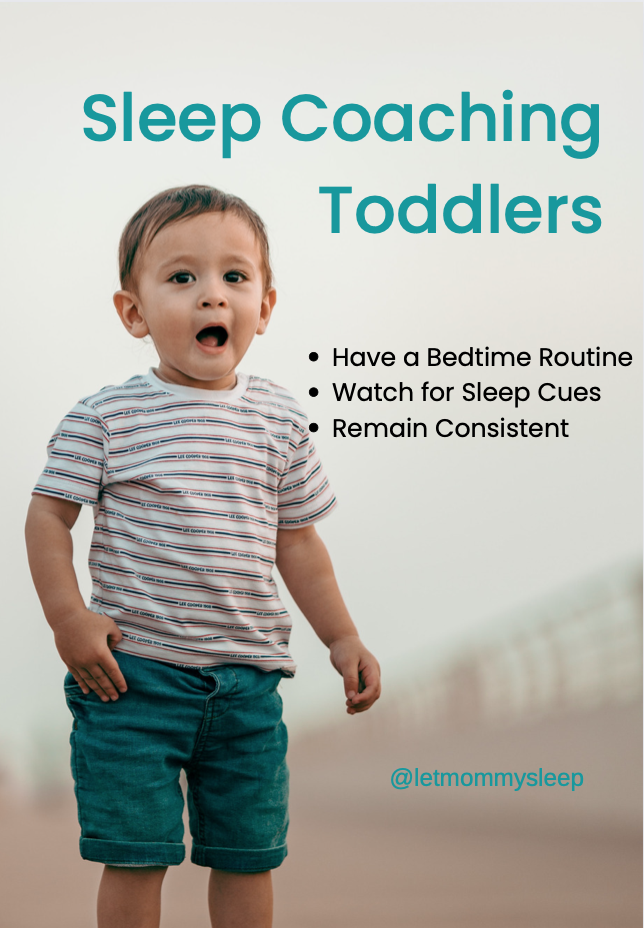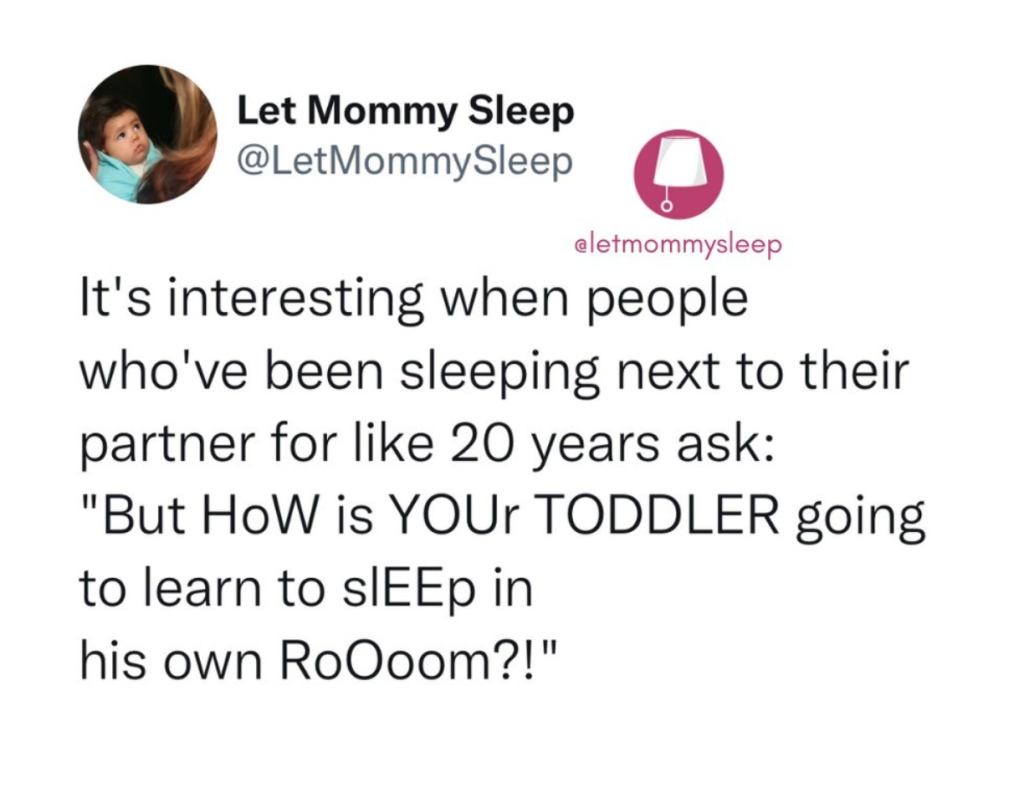Sleep Coach Your Toddler: A Parents Guide
updated, May 26, 2023 – Do you wonder why your toddler wakes up through the night? When will your child get on a routine or nap better? Parents of toddlers often have the same questions we hear about newborns. At Let Mommy Sleep our team of night nurses, nannies and postpartum doulas reassure parents: even if they haven’t been sleeping through the night, it’s not too late to sleep coach your toddler.
Getting Ready to Sleep Coach Your Toddler
A question we’re often asked at LMS is if we’ll soothe toddlers back to sleep if they wake through the night. Even though the night nannies are there to provide newborn care, the answer is yes we will try to care for toddler siblings. But here’s what we’ve learned: toddlers are usually not waking due to hunger or a wet diaper, they want MOMMY or DADDY. Understanding this distinction is crucial for successful sleep training.
Most toddlers adjust to sleep coaching within 1–3 weeks, though some take longer so remember to keep this expectation in mind. Consistency is key, and small setbacks are normal especially with illness, travel or changes in routine.

Why Toddlers Wake at Night
Toddlers’ sleep cycles are shorter than adults’, and they’re sometimes experiencing separation anxiety, nightmares or transitions between light and deep sleep. Knowing this helps parents respond calmly rather than react in frustration. And if a toddler has never slept through the night without a parent’s help, it makes sense that they will continue to expect parent visits in the middle of the night -they don’t know any other way.
Pave the Way with Communication
Once you decide that it is appropriate for your toddler to learn to sleep through the night on their own, explain the change in an age-appropriate way:
- Include your toddler in planning: Have a short family meeting to explain expectations, like staying in bed until the wake-up clock goes off. Review the plan nightly before bedtime.
- Use positive reinforcement during the day. For example: “Wow, you’re growing up, and this new sleep routine is for big kids!”
- Discuss nighttime expectations: “Remember, if you wake tonight, I’ll come in and lay you back down, but I won’t lie in bed with you.”
- Reward charts can work too. For example, after three nights staying in bed, your child could choose a small toy.
Some parents consider sleep training when moving toddlers from the crib to the big kid bed. To learn more about that, read How to Ease Toddlers Into Big-Kid Beds.
It’s a Learned Skill
Your toddler must learn the skill of putting himself to sleep without help. But you can teach the skill without making him cry-it-out by communicating and then gradually intervening less and less through the night. Here’s how:
Slingshot Method: A Gentle Approach
When sleep training toddlers, you can do the regular wind down routine and then leave the room, checking in on your child as needed, or you can try this method:
- Start awake but calm: Place your toddler in bed while drowsy but awake. Follow your usual wind-down routine (bath, books, rocking).
- Gradual withdrawal:
- On Nights 1–2: Sit beside the bed, reassure with voice or touch, gently place them back if standing.
- Nights 3–4: Move chair farther from bed, reassure as needed.
- Nights 5–6+: Sit near the doorway, then eventually outside the room.
Key point: The goal is, “I’m here to help you calm down, but it is your job to fall asleep.”
Does this mean you must stop co-sleeping with your toddler? Nope. It’s completely normal for little ones to go through stages of wanting to sleep in the big bed. Like grown-ups, they may feel anxious or nervous about things. They may lack the words to verbalize their worries but they do know that being in the cozy bed with parents is comforting.

Sleep Coach your Toddler: Handling Nighttime Out-of-Bed Behavior
If your toddler repeatedly gets out of bed and comes to your room, and you want them to sleep in their bed:
- Calmly return them to bed.
- Avoid lengthy interaction or play.
- Expect to repeat this 10–15 times; consistency is crucial.
Tip: Use a wake-up clock that turns a different color when it’s morning time, or nightlight to reinforce the idea that it’s still bedtime.
Don’t Begin on Empty
Make sure on the day that you begin sleep coaching that your child has a full “sleep tank”; they’ve had a good nap during the day- if that means that you need to take her for a walk in the stroller, or for a car ride, then do it. Do whatever you need to do to get sleep. The naps should end 4-5 hours before bedtime. Remember, daytime sleep = nighttime sleep!
I have a plan, now what?
Soothing Bedtime Routine:
Toddlers, like babies, need a wind-down routine to transition from their energetic daytime selves to being receptive to sleep. This routine can include:
- Bath or quiet play
- Reading or singing
- Lights dimmed
This transition signals the brain it’s time to sleep.
Bedtime cues include: Eye rubbing, yawning or fussiness indicate readiness. Missing these cues can lead to overtiredness and cortisol release, making it harder for them to settle.
Toddlers + Newborns: Maximizing Sleep for Both
In a perfect world, toddlers would be sleeping through the night before the new baby arrives. But we all know that the perfect world gets turned upside down pretty often in early parenting! Here are some strategies to help maximize sleep for your baby, your toddler and hopefully you:
- Divide and Conquer – One parent gets the toddler to sleep and the other handles the infant. Getting both children to bed at the same time can help both children wind down properly, giving the toddler a better chance at uninterrupted sleep.
- Gradual adjustments– If your toddler is used to having a parent present to get to sleep and you need to lessen the time spent doing this, gradually transition them to new habits. For example, you can slowly reduce the amount of time you spend rocking by moving to sitting beside their bed.
- Hire help – Consider a mother’s helper or babysitter who can look after your newborn while you concentrate on your toddler’s bedtime routine for a few hours each night. You can read the Ultimate Guide to Baby Sleep Training if you’re interested in infant sleep coaching.
Once you begin, try your best stick to sleep training. Don’t go back to old habits like lying down beside your child until they are asleep, as this sends a mixed message. And that’s not fair to your toddler! It’s hard when you’re in the thick of sleep deprivation, but try to remember that your child is seeking reassurance when they wake up in the night.
We’re always happy to talk through toddler sleep on Reddit, join us anytime.
Quick Reference: Sleep Coach your Toddler at a Glance
| Step | Focus | Key Actions |
|---|---|---|
| 1 | Communicate | Talk about the plan, use rewards |
| 2 | Routine | Bath, books, lights down |
| 3 | Gentle withdrawal | Slingshot Method |
| 4 | Boundaries | Return to bed calmly, consistently |
| 5 | Support | Prioritize naps and nutrition |
| 6 | Adjust | Respond to regressions with patience |
| 7 | Sustain | Rest and self-care for parents |
Categories
- Corporate Care & Partners
- COVID19 Archive
- En Espanol
- Expert Guides
- Hiring a Night Nanny
- Infant Safety
- Infant Sleep Hub
- Newborn Care
- Postpartum Health
- Twins & Multiples
- Work as a Night Doula
- zPost Archives
